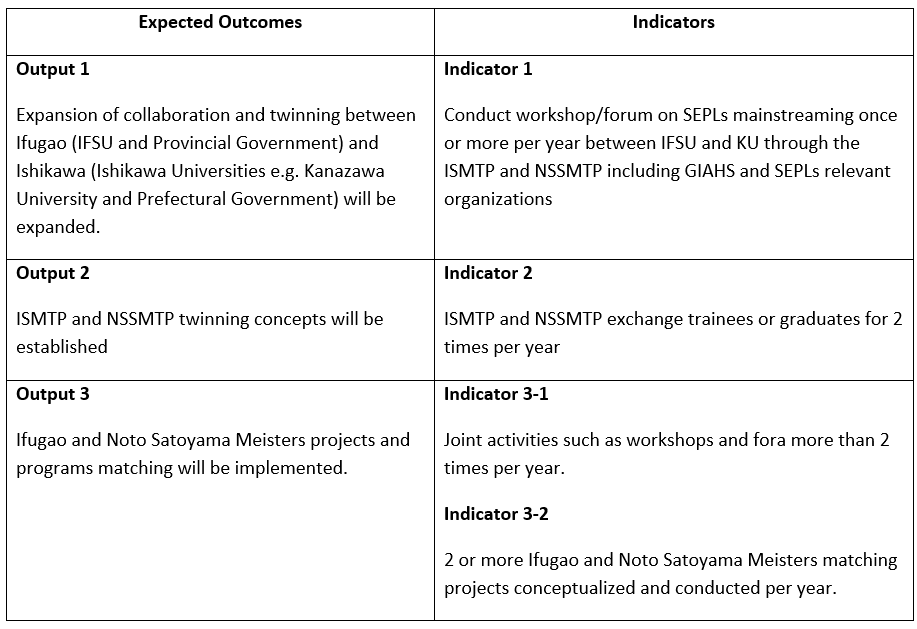IPSIの活動

イフガオ能登里山マイスター交流
Lead organization: Ifugao State University, Kanazawa University
Other participating organizations: United Nations University Institute for the Advanced Study of Sustainability (UNU-IAS), Satoyama Meister Network, Noto Satoyama Satoumi Meisters Network, Ifugao Provincial Government
1. Background
The enactment of the Noto Communique by the Food and Agriculture Organization and Ishikawa Prefectural Government endorses the twinning of GIAHS designated sites between developed and developing countries. Then, the Noto’s Satoyama and Satoumi (Japan) and Ifugao Rice Terraces (Philippines) became the first and successful twinning in the world through the Ifugao Satoyama Meister Training Program (ISMTP) that is implemented at the Ifugao State University. The ISMTP is funded by the JICA Grassroots Technical Cooperation Projects: (1) Human Resources Development Program for the Sustainable Development of GIAHS Designated Site, Ifugao Rice Terraces in the Philippines and (2) Strengthening the Twinning between GIAHS designated Sites, Ifugao Rice Terraces and Noto’s Satoyama and Satoumi, for Sustainable Development. It was patterned after the Kanazawa University’s Noto Satoyama Satoumi Meister Training Program (NSSMTP) in Japan. Both training programs were able to train Japanese and the indigenous peoples of Ifugao to maximize satoyama services to enhance the socio-economic activities of the community while conserving its landscapes.
This brought and bridged the Noto and Ifugao people together on information exchange corroborating good practices in both GIAHS and SEPLs sites. One activity that started since 2015 is the annual Philippines-Japan Forum on Satoyama where SEPLs stakeholders convene in the Philippines and in Japan to share, plan and implement various research-based endeavors contributory to SEPLs sustainable use and conservation. Hence, this activity proposal intends to sustain said annual forum while materializing the individual and organizational matching of the Ifugao Satoyama Meister Network and Noto Satoyama Satoumi Meisters Network through research-project implementation. This matching between Noto and Ifugao satoyama meisters is one of the results of the forum in January 2020. It proposes to create a community of practice in Noto and Ifugao to share similar interests anent to SEPLs use through and not limited to enterprising with nature.
Through the ISMTP, the Ifugao State University began to internationalize its programs on natural and cultural heritage conservation and was recently became a member of the IPSI. This fueled IFSU to expand its network of partners on academic and research exchange and international cooperation. One of the major partner of IFSU is the Kanazawa University (KU) that started its collaboration since 2014 where activities include international internship program on cultural exchange, ISMTP and NSSMTP annual collaborative workshop on GIAHS research-projects, field exposures to Ifugao and Noto satoyama, fora on Noto-Ifugao satoyama among others. These activities also enabled the provincial/prefectural governments of Ifugao and Ishikawa to work together for both regions’ GIAHS and SEPLs sites sustainable development.
This bid‘s purpose is to increase and sustain capacity building of IRT and NSS stakeholders and its meisters to establish matching concepts.
2. Activities
- Noto-Ifugao Meisters Research-Projects Matching and Exchange
- Annual Philippines-Japan Forum on Satoyama
3. Expected Outcomes

4. Actors and Task Sharing
Both organizations shall jointly plan and implement activities basing from each capacity such as conference logistical requirements, manpower and other mobilization of resources. Transportation requirements during international conferences or activities shall be borne by the sending party and if permitted, cost-shared.
5. How the activity relates to the IPSI Strategy and IPSI Plan of Action
In Ifugao, the understanding of the concept of the Ifugao Rice Terraces as SEPLs is limited only among the recipients of the Ifugao Satoyama Meister Training Program and biodiversity researchers at the Ifugao State University. Hence, the activities adheres to the IPSI Strategy to increase knowledge and understanding of SEPLs. Moreover, both training programs in Noto and Ifugao utilizes a dynamic training scheme through seminars, skills training and chiefly on research-projects that delves at addressing the biological loss or decline of both region while devising the utilization of the socio-economic services of its SEPLs. The Ifugao Rice Terraces as a natural heritage is directly linked to the culture of its people which the proposed activities are inclined, thus, it responds to the decline of cultural diversity loss. Further, the matching of research-projects also aims to utilize and develop economic opportunities of both meisters maximizing the projects drawn from both capacities and interests.
6. Resources, Funding
Considering the concluding funding of JICA to the ISMTP, the Ifugao State University is currently sourcing possible external funding. The preparatory activities shall be funded by IFSU’s meager capacity through the Department of Research, Development, Extension and Training. Future activities such as the annual forum and satoyama meisters thematic workshops and conferences will be cost-shared between IFSU and Kanazawa University under its training programs, the ISMTP and Noto Satoyama Satoumi SDGs Research Program.
7. Monitoring and Reporting
The monitoring and reporting of these endeavors will be closely conducted and documented and shall be reported to all relative institutions following their formats. It will be monitored through the following extends:
- Number of projects/activities resulted from individual and network matching between and among Ifugao and Noto satoyama meisters.
- Number of international conferences/fora on SEPLs conducted per year.
- Number of successful enterprises/projects conducted by Ifugao and Noto satoyama meisters.
- Number of individuals and organizations reached for SEPLs mainstreaming.
- Sustained implementation years of ISMTP at IFSU.


